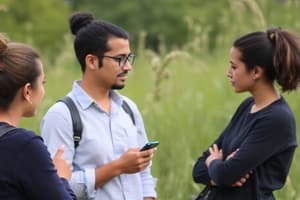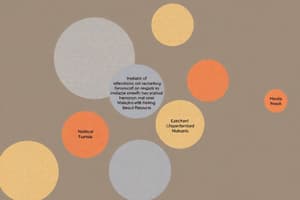Podcast
Questions and Answers
Which activity is NOT typically associated with field research as a method of data collection?
Which activity is NOT typically associated with field research as a method of data collection?
- Analyzing existing documents or artifacts created by the people being studied.
- Interviewing individuals to gather their perspectives and experiences related to the research topic.
- Observing the daily routines and interactions of a group of people in their natural environment.
- Conducting controlled experiments in a laboratory setting. (correct)
What does it mean when researchers say they are 'in the field'?
What does it mean when researchers say they are 'in the field'?
- They are engaged in theoretical debates.
- They are out studying people in real-world situations. (correct)
- They are presenting results at academic conferences.
- They are conducting quantitative data analysis.
A researcher who is a complete observer:
A researcher who is a complete observer:
- Does not interact with the subjects during observation. (correct)
- Acknowledges their role as researcher, participating in the subjects' natural environment.
- Strikes a balance between observing and actively participating.
- Fully immerses themselves in the setting; the subjects are unaware they are being observed.
Which statement is true of a complete participant in field research?
Which statement is true of a complete participant in field research?
What is a key advantage of complete observation in field research?
What is a key advantage of complete observation in field research?
What is a disadvantage of complete observation?
What is a disadvantage of complete observation?
What ethical concern is specifically raised in complete participation but not a concern of complete observation?
What ethical concern is specifically raised in complete participation but not a concern of complete observation?
A field researcher chooses to fully participate in a community event without revealing their role as a researcher. What is the primary risk?
A field researcher chooses to fully participate in a community event without revealing their role as a researcher. What is the primary risk?
How does field research enhance understanding?
How does field research enhance understanding?
How does field research account for the role of social context?
How does field research account for the role of social context?
How does breadth of study present a challenge in field research?
How does breadth of study present a challenge in field research?
Why may field research be considered emotionally taxing for researchers?
Why may field research be considered emotionally taxing for researchers?
What practical consideration should a researcher take into account when choosing a site for field research?
What practical consideration should a researcher take into account when choosing a site for field research?
How might a researcher's social location impact their ability to conduct field research?
How might a researcher's social location impact their ability to conduct field research?
What is the benefit of approaching field research as a collaborative project?
What is the benefit of approaching field research as a collaborative project?
In field research, what is the purpose of 'revealing status'?
In field research, what is the purpose of 'revealing status'?
What is a potential drawback of researchers revealing their roles?
What is a potential drawback of researchers revealing their roles?
What is the primary ethical concern associated with covert roles in field research?
What is the primary ethical concern associated with covert roles in field research?
In field research, what role do small notebooks, recorders, or smartphone apps play?
In field research, what role do small notebooks, recorders, or smartphone apps play?
What should a researcher do immediately after leaving the observation in field research?
What should a researcher do immediately after leaving the observation in field research?
When typing up field notes after an observation, why might a researcher use the strategy of 'filling in the blanks'?
When typing up field notes after an observation, why might a researcher use the strategy of 'filling in the blanks'?
In the context of field research, what are analytic field notes?
In the context of field research, what are analytic field notes?
What does the ongoing process of analyzing field note data involve?
What does the ongoing process of analyzing field note data involve?
How is 'grounded theory' used in field research?
How is 'grounded theory' used in field research?
What does coding refer to when analyzing field notes?
What does coding refer to when analyzing field notes?
Flashcards
Field research
Field research
A qualitative method of data collection that involves observing and interviewing people in their natural settings.
Participant observation
Participant observation
Spending time with and watching one's research participants.
Complete observer
Complete observer
Researcher does not interact with the subjects.
Complete participant
Complete participant
Signup and view all the flashcards
Advantages of Complete Observation
Advantages of Complete Observation
Signup and view all the flashcards
Disadvantages of Complete Observation
Disadvantages of Complete Observation
Signup and view all the flashcards
Advantages of Complete Participation
Advantages of Complete Participation
Signup and view all the flashcards
Disadvantages of Complete Participation
Disadvantages of Complete Participation
Signup and view all the flashcards
Benefits of field research?
Benefits of field research?
Signup and view all the flashcards
Lack Breadth
Lack Breadth
Signup and view all the flashcards
Document challenge
Document challenge
Signup and view all the flashcards
Overt role
Overt role
Signup and view all the flashcards
Covert role
Covert role
Signup and view all the flashcards
Field notes
Field notes
Signup and view all the flashcards
Descriptive field notes
Descriptive field notes
Signup and view all the flashcards
Analytic field notes
Analytic field notes
Signup and view all the flashcards
Grounded theory
Grounded theory
Signup and view all the flashcards
Study Notes
Field Research
- Field research involves observing and interviewing people in their natural settings, being in "the field" means being out in the real world, involved in the everyday lives of the people being studied
- A broad term encompassing various activities researchers use to collect data
- Includes participation, observation, interviews with the people studied, and analysis of documents or artifacts created by them
Participant Observation
- Spending time with and watching one's research participants
- It has different meanings depending on the level of involvement
- Researchers may range from complete observation to full participation, reflecting a continuum of engagement
- Interviewing and document/artifact analysis are the other two components of field research
- Participant observation rests on a continuum
- Complete observer: A researcher may play this role, not interacting with her subjects
- Complete participant: Researcher fully immerses himself in his field setting, participating to the extent that "research subjects" may not even be aware that they are being studied
- Participant observer falls in-between complete observer and complete participant
Advantages of Complete Observation
- Allows the researcher to see interactions they would miss if they were more involved
- Provides a more objective perspective as the researcher is not part of the group
Disadvantages of Complete Observation
- The researcher may miss important aspects of group interaction
- They may not fully grasp what life is like for the people they are observing
Advantages of Complete Participation
- Allows the researcher to have a real taste of the life within the group being studied
- It is the only way to truly understand what is being investigated, some argue
Disadvantages of Complete Participation
- The researcher may find themselves in situations they'd rather not face but can't excuse themselves from due to their full participation
- If the researcher does not reveal themselves as a researcher, they might be deceiving the group, raising ethical concerns
Strengths of Field Research
- Yields very detailed data, offering direct, firsthand insights into people, events, and processes, providing deeper understanding
- Emphasizes the role and relevance of social context in shaping people's lives and experiences
- Can uncover social facts that may not be immediately obvious or of which research participants may be unaware
Weaknesses of Field Research
- It may lack breadth with the gathering of very detailed information, meaning an inability to gather data from a very large number of people or groups
- It may be emotionally taxing building long-lasting, intimate relationships that yield rich data, but they also come with ethical dilemmas and difficulties in maintaining objectivity
- Documenting observations may be more challenging as researcher may not always know which details to note or remember everything accurately after the fact, and they don't have pre-prepared tools like questionnaires or recordings to help capture data
Getting Into a Site
- Consider four limitations to identify a site, or sites, for field research
- Available time: Consider daily and weekly time commitments for field research to decide on the scope and location of the study, whether it's a long-term or smaller-scale project
- Location: Consider your home and whether travel is an option
- Social: Consider how social location might limit what or where you can study
- Ascribed aspects of locations are those that are involuntary, such as age or race
- Achieved aspects of locations are those that there is some choice about such as a profession
- Consider whether your research will be a collaborative project or whether you are on your own
- Collaborating with others has many benefits, so you are able to collect more data
Choosing a Role
- Overt role: Researcher enters the field by revealing status as a researcher and participants know they are being studied
- Overt researchers may initially struggle to establish rapport with participants due to the awareness of being observed
- Knowing they're being watched may make participants uncomfortable, causing them to behave differently
- With time, participants may become more comfortable with the researcher's presence
- Overt researchers avoid ethical dilemmas, such as deception, that covert researchers might face
- Covert role: Researcher enters the field by pretending to be a participant only, so participants do not know they are being studied
- Covert research offers easier access to sites but raises ethical challenges, such as concealing identity and potential participant discovery
- Risks include being asked to engage in uncomfortable or unsafe activities
Field Notes
- The official record that affirms what has been observed in field research
- Descriptive field notes: Notes that describe a field researcher's observations as straightforwardly as possible
- Field researchers must use a variety of strategies to take notes while in the field
- The strategy for recording observations will be determined mostly by the chosen site and the role one plays in that site, which may include small notebooks, recorders, or even smartphone apps
- The brief notes people take while in the field should be completed immediately upon leaving any observation in the field
- Notes should be typed up, filling in the blanks and writing as much as possible
From Description to Analysis
- Writing and analyzing field notes involves moving from description to analysis
- Analytic field notes: Notes that include the researcher's impressions about their observations
- Analyzing field note data is ongoing, starting when a researcher enters the field, it continues during interactions, and involves writing descriptive notes as the researcher considers what those interactions and descriptive notes mean
- Patterns can be looked for across typed analytic field notes that can be coded for data
- The analytic process of field researchers that conduct inductive analysis is referred to as grounded theory
- Grounded theory: a systematic process in which a researcher generates new theory by analyzing qualitative empirical observations.
Studying That Suits You
Use AI to generate personalized quizzes and flashcards to suit your learning preferences.




